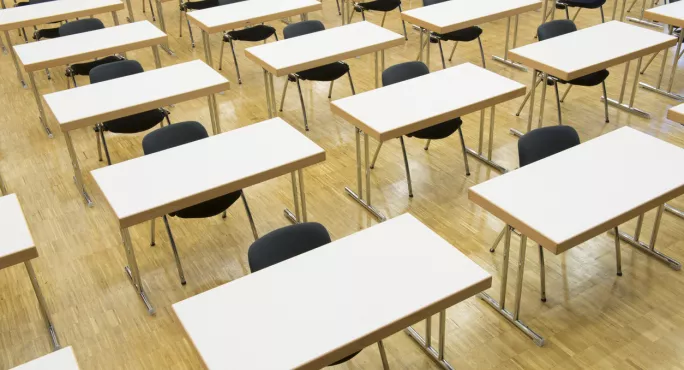Imperfect exam replacement model ‘is nobody’s fault’

In a year like no other, our secondary schools are again under pressure to ensure that young people in the senior phase get the qualifications they deserve. I don’t think we can underestimate how committed our teachers are to ensuring that the qualifications are robust, evidence-based and provide a true reflection of their students’ ability. Nor can we underestimate, in this year like no other, the challenges that they are facing.
The term after Christmas is the busiest in a secondary school. Teachers work exceptionally hard in that term getting young people ready for their examinations in May.
I can still remember, as a principal teacher of maths, getting everything ready across all the classes - pulling together the assessment evidence and honing the students’ skills. That’s the term where you go for the A and B grade - where you really bring together their skills, so that the young people get the best-possible qualifications.
Background: Scotland’s 2021 exams cancelled by education secretary
News: Call for government to rethink exam replacement plans
School leader’s take: ‘Saying there’s no need for exams lets down schools’
Teacher’s take: Why teachers’ worst fears over exams have come true
SQA: ‘No requirement to replicate full formal exams’
The 2020 qualifications fiasco: 12 key messages from experts who explored the SQA debacle
August to December is about developing their knowledge and, in December, if they sit a prelim, that’s likely to be sufficient evidence of a C. It would also identify those with the potential going forward but it would not give you sufficient evidence for an A, because at that stage you just haven’t covered enough content.
January to March is the real hard slog in classrooms across the country, and this year we haven’t had that. Remote learning was there and teachers worked really hard to deliver in as creative a way as possible, but - no matter how you dress it up - it’s just not the same as being in the classroom.
SQA assessment 2021: It’s not like normal exams
Without the second national lockdown, we would have been able to spread out assessment over that three-month period - and after the spring break as well - as part of normal business, and teachers would have had firm evidence of their students’ ability from class work, from homework and from ongoing classroom assessment. We don’t have that.
I’ve never seen teachers work so hard and be so concerned, but the current situation is nobody’s fault. Hence why we need to have an assessment schedule on this side of the Easter break.
There are some that are saying this is just like an exam diet, but without the preparation. I disagree. Our schools have chunked up the assessments to align with students’ learning. They are being flexible and responsive with back-up plans - just in case students have to self-isolate or are not having the best day.
Of course, they have made a schedule - young people need to know when the assessments are taking place, so that they can work with their teachers to prepare. Parents, meanwhile, need to know so that they can support their child. So let’s be realistic and let’s not attach blame - again, this is nobody’s fault.
We will make sure that our young people get all the qualifications they deserve. When they go on to their next stage then they may have to work a little bit harder, and it may take a little bit longer - but they will get there.
In a normal year, formal exams can be an incredibly stressful and distressing experience for some young people. Not all have success from that, and one of the positives to come out of all of this is it has opened up the debate about assessment.
We have to be optimistic about our young people. They need to know that we are behind them.
I know that teachers in Glasgow and all across the country are doing exactly that - making sure every young person achieves the qualifications they deserve.
Maureen McKenna is Glasgow City Council’s director of education. She tweets @maureen0207
You need a Tes subscription to read this article
Subscribe now to read this article and get other subscriber-only content:
- Unlimited access to all Tes magazine content
- Exclusive subscriber-only stories
- Award-winning email newsletters
Already a subscriber? Log in
You need a subscription to read this article
Subscribe now to read this article and get other subscriber-only content, including:
- Unlimited access to all Tes magazine content
- Exclusive subscriber-only stories
- Award-winning email newsletters
topics in this article



